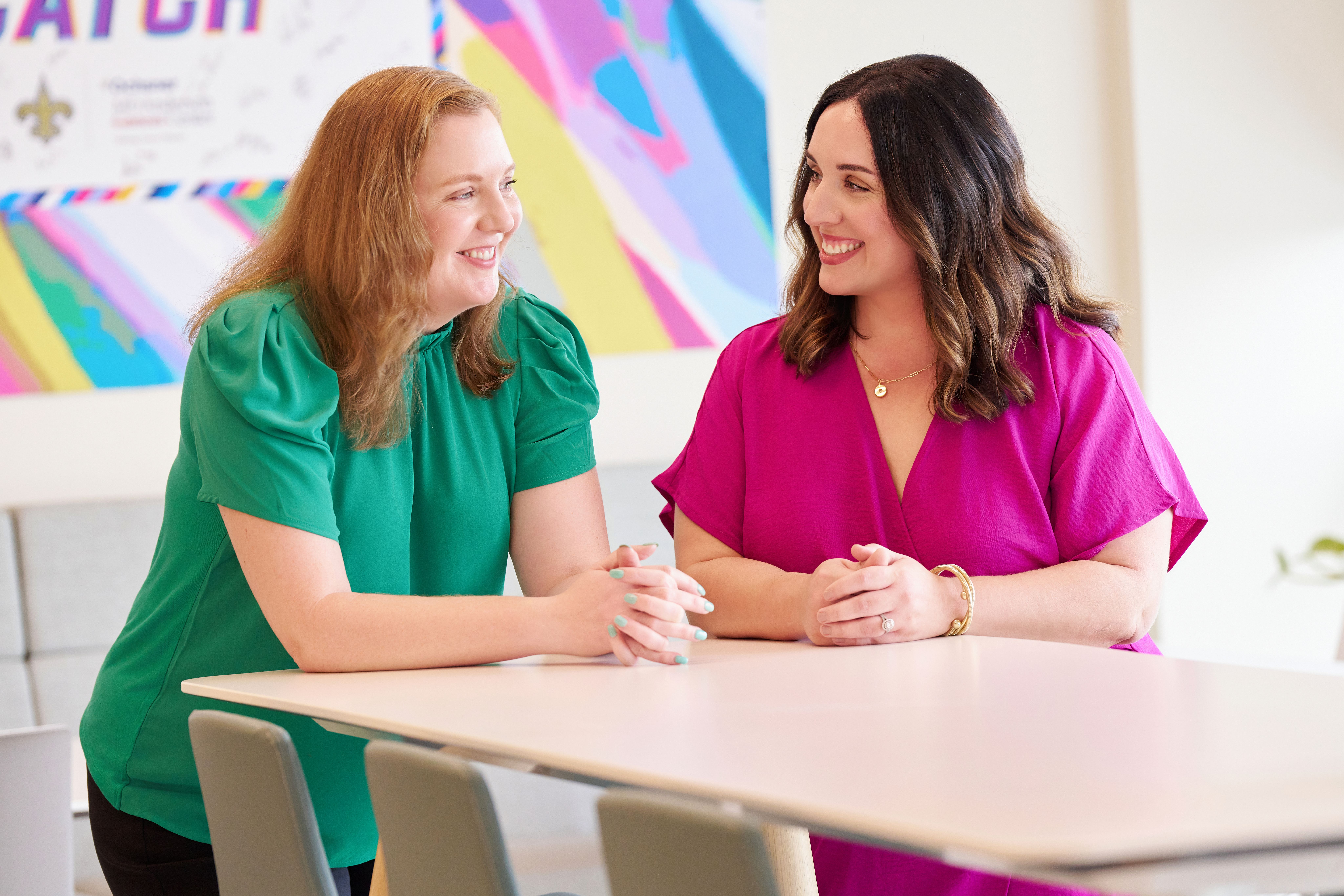A Passion for Helping People With Cancer
“I was a senior in high school when my father was diagnosed, so I became his caregiver while my mother worked. All of that is what drove me to where I am today," an oncology nurse explained.
Lauren Yakelis, B.S.N., RN, (right) was nominated for the Extraordinary Healer award by Kristin Linde, M.H.A., B.S.N., RN, BMTCN (right).
PHOTO BY ADRIENNE BATTISTELLA

To say that Lauren Yakelis' teen years were difficult would be an understatement. At 15, the star high school volleyball player was diagnosed with Chiari malformations of the brain that required two surgeries to correct. Then, in 2005, Hurricane Katrina destroyed her family’s home in New Orleans as well as the high school that Yakelis and her siblings attended. Three weeks after moving to Baton Rouge, Louisiana, for a fresh start, her father was diagnosed with stage 4 colon cancer, from which he died two years later.
Yakelis managed to rise from these tragedies to find her true calling as an oncology nurse.
“The brain surgeries helped me understand pathology and the human body, and I started volunteering at Children’s Hospital to help other young patients,” she recalls. “I was a senior in high school when my father was diagnosed, so I became his caregiver while my mother worked. All of that is what drove me to where I am today.”
Yakelis decided to practice at Ochsner Medical Center in New Orleans, where she is manager of the Bone Marrow Transplant Clinical Program. Her extensive responsibilities include overseeing quality metrics for bone marrow transplant, managing the continuation of care between inpatient and outpatient settings, providing education to inpatient and outpatient staff regarding new treatments, and maintaining Foundation for the Accreditation of Cellular Therapy accreditation.
While recognizing the daily challenges of oncology nursing, Yakelis is quick to note that she finds her job to be rewarding.
“I’ve had a passion for helping people since I was a child,” she says. “I love walking into a patient’s room with a smile and asking, ‘What can we do for you today?’ It brings me energy and life.”
Yakelis played a pivotal role in launching Ochsner Medical Center’s groundbreaking adult CAR-T cell therapy program, the first of its kind in Louisiana. CAR-T cell therapy uses the patient’s own T cells by “programming” them in the lab so they can find and destroy cancer cells.
“The first six patients to receive CAR-T cell therapy here have all been in remission since their day-30 scans,” Yakelis reports. “Patients from Alabama and elsewhere are coming to New Orleans for the treatment. We’ve also partnered with MD Anderson Cancer Center, so we’re one of their centers as well now.”
The CAR-T cell therapy program is a broad example of how Yakelis helps care for patients with cancer. Also, she strives to establish a personal connection that helps patients feel calm and comfortable. She recalls a recent patient who was stressed over having a central line placed in her chest. The procedure was performed, but the patient later complained of breathing difficulties. Yakelis learned that the patient’s lung had been punctured, and stayed at her side while the pneumothorax was repaired. “She successfully had her stem cells collected yesterday,” Yakelis says of the grateful patient.
Yakelis’ helping nature also extends to her colleagues, as evidenced by her role in the stem cell transplant department winning the coveted Patient Safety Department of the Year award. “At Ochsner, the quality metrics that we track allow us to improve every year. We monitor central line infections, catheter-associated infections, MRSA and patient deaths, among other things,” Yakelis explains. “We see trends and consider what we can do to improve.”
Yakelis investigated a rise in Clostridioides difficile infections and found an array of potential causes ranging from how dietary staff handled patient trays to the equipment used by environmental services to clean patient rooms.
“I helped create changes not just for nurses, but other departments as well,” Yakelis notes. “For example, we found the central line dressing kits had the sterile dressings in the wrong order, which affected sterility. We reached out to the company that manufactured them, and the company fixed the problem. This award was given to us because we had great quality metrics, and our trends kept improving.”
